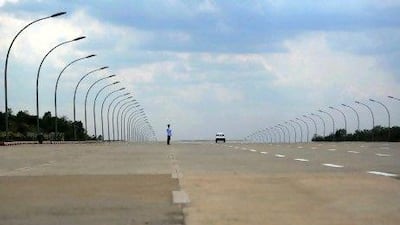NAYPYIDAW // Two solitary cars are all that can be seen on the 20-lane motorway that leads into Naypyidaw. From a distance, a solitary motorbike comes into view. This is rush hour in the world's emptiest capital.
Naypyidaw, whose name means "royal city of the sun", with its dead-straight boulevards, occasional clusters of identical housing, and handful of shops and restaurants, feels less like a capital city and more the scene of a recent emergency evacuation. It is testament to the hubris and paranoia of the military regime that ruled Myanmar for almost 50 years.
But during the past year, Naypyidaw has become a focus of international attention as a wave of reforms have come out of the enormous parliament complex on the outskirts of town - a collection of 31 palatial buildings guarded by several kilometres of iron gating and an artificial moat.
Political prisoners have been released, censorship rules eased and economic reforms threaten to undermine the military elite's lucrative grip on the black economy.
Last month saw democracy icon Aung San Suu Kyi rent a home in the city after she and 42 members of her National League for Democracy (NLD) won seats in parliament in a by-election that, for once, was not rigged.
That gives the NLD six per cent of the seats in a parliament still dominated by present and former members of the military. But Ms Suu Kyi's international stature - she spent 15 years under house arrest - ensures they will be a voluble presence when the next session begins in July.
The historic moment when the NLD, after boycotting the 2010 election, took their seats did not impress everyone, however.
"It was boring," said Naing Ngar Lin, one of the newly elected NLD members, who represents one of the capital's four constituencies. "They just talked about procedure for a long time."
"Boring" is a word often heard in relation to life in Naypyidaw.
Media reports have put the cost of building the city at around US$4 billion (Dh14.6bn), an expense allegedly driven by the junta's fear of an invasion by sea at the former capital of Yangon, 320 kilometres south, as the British did in the 19th century.
Somehow, the regime kept Naypyidaw a secret from almost everyone until its unveiling in November 2005. Civil servants were given a day's notice to relocate inland from Yangon.
The government claims a million people are living here. If that is true, they are well hidden.
"I go back to my family in Yangon every Friday," said one official in the ministry of finance, who asked not to be named. "There is not much to do in Naypyidaw."
Among the scant entertainment options is a lacklustre water fountain park and a surprisingly modern zoo just outside the city.
On a recent morning, a group of Buddhist monks were feeding some noisy baboons. The rest of the park was eerily quiet. Two leopards had grown fat and somnolent in the isolation of their cage.
The coming parliament sessions promise to be considerably more lively.
Debate continues to rage about the reasons behind the sudden rush of reforms and how far they will go.
Many are worried that hardliners in parliament will balk at the rapid changes spearheaded by the country's president, Thein Sein, since he took office in February 2011.
In a bid to embolden the reformists, the European Union, Norway and Canada have rewarded the changes by suspending some sanctions, while Japan cancelled $3.7 billion of debt.
But analysts cast doubt about a split between progressive and conservative factions within the military elite.
"It suits the military to present a narrative of reformists and hardliners," said Jan Zalewski, a Burmese-speaking Asia analyst with IHS Jane's, which monitors military-related issues
"In reality, the military will ensure all reforms reinforce their prominent role in national politics and, essentially, control over it. Unfortunately this is likely to come at the cost of some democratic freedoms."
The NLD has been criticised in some quarters for capitulating too quickly to the government. Ms Suu Kyi recently backed down from her refusal to pledge allegiance to the constitution - a document widely reviled for guaranteeing a central political role to the military.
There has also been anger, too, at her refusal to condemn the continuing human-rights violations in the conflict with ethnic rebels in the country's border regions. Renewed fighting in Kachin district in the north of the country, for example, has brought reports of torture, rape and forced displacement against civilians.
But Mr Lin, who was a private tutor in Yangon before becoming a member of parliament for the NLD last month, says breaking the grip of the military will be a long process.
"The ethnic situation is a trap," he said. "That is a line that we cannot cross yet. The military are very powerful still. Every government office is controlled by them, and that will not change easily.
"I feel a great burden on my shoulders. This is not just about victory for the NLD - we are trying to create a democracy out of nothing."
foreign.desk@thenational.ae
Follow
The National
on
& Eric Randolph on

